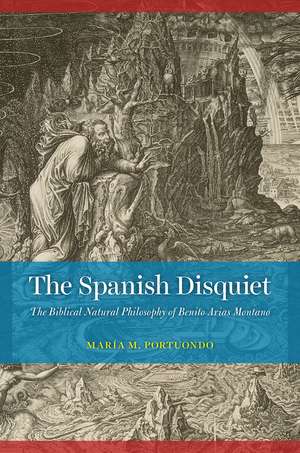The Spanish Disquiet: The Biblical Natural Philosophy of Benito Arias Montano
Autor María M. Portuondoen Limba Engleză Hardback – 25 apr 2019
In this book, historian María M. Portuondo takes us to sixteenth-century Spain, where she identifies a community of natural philosophers and biblical scholars. They shared what she calls the “Spanish Disquiet”—a preoccupation with the perceived shortcomings of prevailing natural philosophies and empirical approaches when it came to explaining the natural world.
Foremost among them was Benito Arias Montano—Spain’s most prominent biblical scholar and exegete of the sixteenth century. He was also a widely read member of the European intellectual community, and his motivation to reform natural philosophy shows that the Spanish Disquiet was a local manifestation of greater concerns about Aristotelian natural philosophy that were overtaking Europe on the eve of the Scientific Revolution. His approach to the study of nature framed the natural world as unfolding from a series of events described in the Book of Genesis, ultimately resulting in a new metaphysics, cosmology, physics, and even a natural history of the world. By bringing Arias Montano’s intellectual and personal biography into conversation with broader themes that inform histories of science of the era, The Spanish Disquiet ensures an appreciation of the variety and richness of Arias Montano’s thought and his influence on early modern science.
Foremost among them was Benito Arias Montano—Spain’s most prominent biblical scholar and exegete of the sixteenth century. He was also a widely read member of the European intellectual community, and his motivation to reform natural philosophy shows that the Spanish Disquiet was a local manifestation of greater concerns about Aristotelian natural philosophy that were overtaking Europe on the eve of the Scientific Revolution. His approach to the study of nature framed the natural world as unfolding from a series of events described in the Book of Genesis, ultimately resulting in a new metaphysics, cosmology, physics, and even a natural history of the world. By bringing Arias Montano’s intellectual and personal biography into conversation with broader themes that inform histories of science of the era, The Spanish Disquiet ensures an appreciation of the variety and richness of Arias Montano’s thought and his influence on early modern science.
Preț: 353.60 lei
Preț vechi: 466.45 lei
-24% Nou
Puncte Express: 530
Preț estimativ în valută:
67.66€ • 72.35$ • 56.41£
67.66€ • 72.35$ • 56.41£
Carte indisponibilă temporar
Doresc să fiu notificat când acest titlu va fi disponibil:
Se trimite...
Preluare comenzi: 021 569.72.76
Specificații
ISBN-13: 9780226592268
ISBN-10: 022659226X
Pagini: 448
Ilustrații: 14 halftones, 1 line drawing
Dimensiuni: 152 x 229 x 38 mm
Greutate: 0.75 kg
Ediția:First Edition
Editura: University of Chicago Press
Colecția University of Chicago Press
ISBN-10: 022659226X
Pagini: 448
Ilustrații: 14 halftones, 1 line drawing
Dimensiuni: 152 x 229 x 38 mm
Greutate: 0.75 kg
Ediția:First Edition
Editura: University of Chicago Press
Colecția University of Chicago Press
Notă biografică
María M. Portuondo is associate professor at the Johns Hopkins University, where she teaches the history of science and technology. She is the author of Secret Science: Spanish Cosmography and the New World, also published by the University of Chicago Press.
Recenzii
"It is easy to get lost in the weeds when struggling to understand just exactly what Spanish humanist Benito Arias Montano was up to as he attempted to elaborate a natural philosophy based exclusively on his own novel interpretation of Hebrew scriptures. For anyone who has had that experience, María Portuondo’s book will prove a useful guide. . . . [The Spanish Disquiet] quite rightly situates his natural philosophical works, elaborated toward the end of his life, within the broader context of his views on biblical exegesis. This is a refreshingly non-secularizing piece of postmodern scholarship. . . . Portuondo opens a fascinating window onto a world of Christian humanism where divine revelation coexisted with collecting seashells."
"As erudite as Joseph Scaliger, as inclined to reform natural philosophy as Francis Bacon, as encyclopedic as Athanasius Kircher, and as interested in biblical exegesis as Isaac Newton, Benito Arias Montano, librarian of Felipe II and editor of the Antwerp Polyglot, was a key figure of Renaissance humanism. This essential book opens up to us his Magnum opus, whose epistemology falls between empiricism and Hebrew philology. María Portuondo restores Hispanic culture to its place in the republic of letters and sheds light on an age of uncertainties, disquiet, and shadows, that is to say, a period of sharp inquiries into the Book of Nature and audacious attempts to reconcile it with the Sacred Scriptures."
"Only a dexterous philologist and a keen observer of nature could unravel the mysteries of creation already contained in biblical accounts. The polymathic Arias Montano produced a new Mosaic natural philosophy from scratch, away from the many ancient systems European humanists had revived. Like her subject, Portuondo radically shifts the ground, offering a strikingly novel interpretation of early modern Spanish science as relentlessly innovative and radical."
